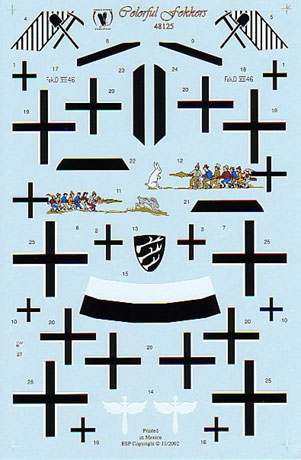S u m m a r y
|
| Catalogue
Number: |
Eagle Strike #48124 “Colorful
Fokkers” |
| Scale: |
1/48 |
| Contents and Media: |
Waterslide decals |
| Price: |
May vary according to place of
purchase (USD$10 if purchased
directly from AeroMaster) |
| Review Type: |
FirstLook |
| Advantages: |
Perfect registration, original
subject choice, thin carrier film. |
| Disadvantages: |
Additional references needed for
louver patterns. |
| Recommendation: |
Recommended |
Reviewed
by Rob Baumgartner

HyperScale is proudly supported by Squadron.com
WW1 aircraft modelers have a lot to be happy about with the constant
release of new kits. For those wanting alternate markings, there is
usually not a lot to choose from. Eagle Strike are trying to put this
right and this sheet goes a long way towards that goal.
Three schemes are provided for and as mentioned in the instructions,
generic cowlings have been shown in the profiles. This is important to
note, as Fokker D.VIIs are notorious for their different louver patterns.
Not only were they different between manufacturers, they evolved as time
went on.
It is a credit to Eagle Strike that the reference used for the making of
this sheet is none other than Fokker Anthology 3 from Albatros
Publications. This should allow the modeller to have the best start
possible as far as accuracy is concerned.
The decals have been sized around the Dragon kit so those with other
maker’s products may have to introduce some alterations.
An amusing aside is that the cover sheet recommends the Hasegawa F-14 kit
be used! Oops…
1. Fokker D.VII (OAW) flown by Uffz. Neimczyk
(or Nimszyk), Jasta 50, 1918.
 Being
an early OAW aircraft, there were none of the multitude of louvers that
were introduced as cooling became a problem. This would be an easy
conversion of the Dragon kit, only needing to have excess louvers scraped
off and redundant access panels filled. New hatches can either be
rescribed or drawn on. Being
an early OAW aircraft, there were none of the multitude of louvers that
were introduced as cooling became a problem. This would be an easy
conversion of the Dragon kit, only needing to have excess louvers scraped
off and redundant access panels filled. New hatches can either be
rescribed or drawn on.
Since 5:4 ratio crosses are on the fuselage and top wing (correctly
supplied), one would expect these to be on the lower wing as well. Here
the designated kit decals are symmetrical but can easily be trimmed to
represent the asymmetrical crosses.
2. Fokker D.VII (OAW) 4649/18 flown by Gef.
Wilhelm Scheutzel of Jasta 65, 1918.
This machine is a mid production OAW built aircraft and as such, has
the small half round louvers. For those who want a simple fix, plastic
discs that are created with a punch and die set. These are then cut in
half slightly off center, bowed, and glued into the proper positions after
the kits ones are removed.
Note that photos of this aircraft show a flare pistol mounted in the
center of the upper wing cutout.
Amazingly, despite all the different colours used for the Swabians, the
images were in perfect register. Those previously wishing to do this
scheme, had to hunt down the old PD Decals sheet which, to save potential
register problems, had to have the outlines colored in by hand.
3. Fokker D.VIIF flown by Vzfz Heinrich Stor of Jasta 66, 1918.
This final Fokker built version matches the Dragon kit louvers and is
the best choice for those not wishing to do any modifications in this
area. Close examination of the photo in Anthology 3 reveals a flare tube
under the cockpit opening on the port side.
This is a wonderful sheet with perfect registration and thankfully, an
original choice of colour schemes. Research is impeccable thanks to the
use of the latest published information from one of the best sources
available.
Test measurements show that the decals are correctly sized for the
Dragon kit. Those that have the Revell kit will have to take their chances
and make allowances for any discrepancies.
Even if you don’t have a 1/48th scale D.VII, buy a sheet anyway as you
never know when someone may release that all new kit…Eduard, Roden, are
you listening?
Recommended.
Thanks to AeroMaster
Products for the review sets
Review Text Copyright © 2003 by
Rob Baumgartner
This Page Created on 22 January, 2003
Last updated
14 August, 2003
Back to
HyperScale Main Page |
Home | What's
New | Features
| Gallery |
Reviews | Reference
| Forum
| Search